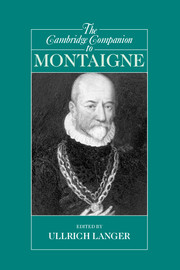Book contents
- Frontmatter
- 1 Introduction
- 2 Montaigne’s political and religious context
- 3 Montaigne’s legacy
- 4 Montaigne and antiquity
- 5 The Essays and the New World
- 6 Justice and the lawlaw: on the reverse side of the Essays
- 7 Montaigne and the notion of prudence
- 8 Montaigne and the truth of the schools
- 9 The investigation of nature
- 10 Montaigne and skepticism
- 11 Montaigne on moral philosophy and the good life
- Bibliography
- Index
7 - Montaigne and the notion of prudence
Published online by Cambridge University Press: 28 May 2006
- Frontmatter
- 1 Introduction
- 2 Montaigne’s political and religious context
- 3 Montaigne’s legacy
- 4 Montaigne and antiquity
- 5 The Essays and the New World
- 6 Justice and the lawlaw: on the reverse side of the Essays
- 7 Montaigne and the notion of prudence
- 8 Montaigne and the truth of the schools
- 9 The investigation of nature
- 10 Montaigne and skepticism
- 11 Montaigne on moral philosophy and the good life
- Bibliography
- Index
Summary
A translation of the Greek phronēsis (Aristotle, Nicomachean Ethics [henceforth NE], vi) and of the Latin prudentia, prudence “is the choice between good and evil” (ii.12, F369, V499 = Ad Herennium, III.3 and Cicero, De Ínventione, ii.160): it is the discernment of what is good for us, or as the OED defines it, the “ability to discern the most suitable, politic, or profitable course of action, especially as regards conduct,” i.e., “practical wisdom, discretion.” The “prudent” leader, like a good helmsman, knows how to steer the ship of the state amidst all the reefs and guide it to a safe port (towards its supreme good). This savoir-faire or skillfulness comes from one's memoria, the knowledge acquired through experience; from one's intelligentia, an understanding of the present situation or casus; and from one's providentia, one's capacities of anticipation - providentia being seen by the Romans as the very etymology of prudentia. In the sixteenth century, prudence is the concept used to think about action and especially political action. It is omnipresent in the Essays. Montaigne begins them emblematically with a discussion of military prudence, and the title of i.1 announces a reflection on the ways and “means” of arriving at a given “end.” He describes himself as a man of action, for he seeks “remedies” for ailments of the soul (iii.4, F632, V832) as well as procedures to follow for arriving at his desired ends (“It is bad procedure to oppose this passion,” iii.4, F630, V830; “we should proceed in the opposite way from the reed,” iii.10, F779, V1018).
- Type
- Chapter
- Information
- The Cambridge Companion to Montaigne , pp. 118 - 141Publisher: Cambridge University PressPrint publication year: 2005
- 3
- Cited by

